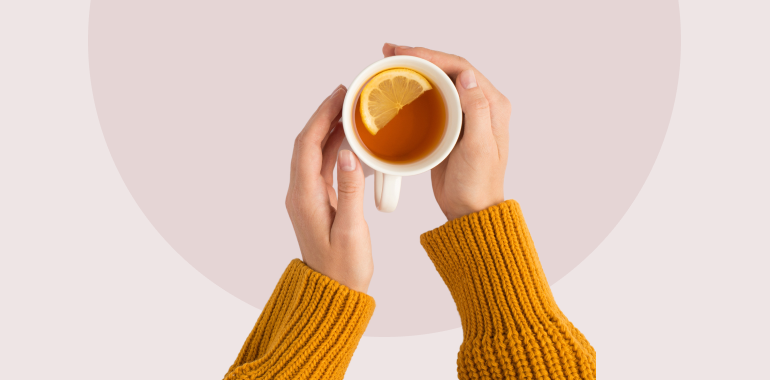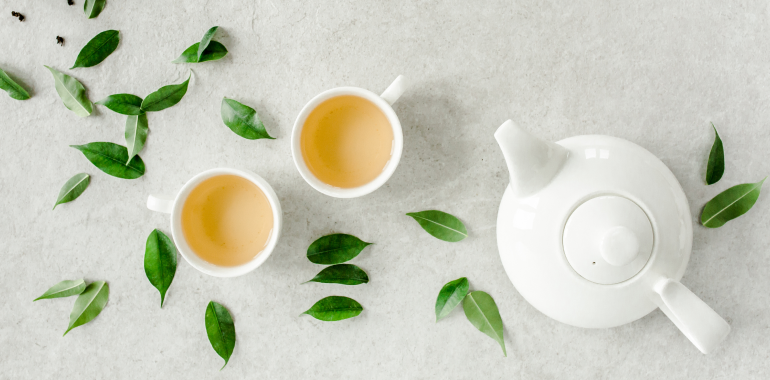Table Of Contents
How Does Drinking Tea Fit Into Fasting?
The answer to this question depends on the type of fasting you are following.
Intermittent fasting (IF) is a popular type of fasting where you restrict your eating to a particular time window each day. During fasting, you can only consume water, black coffee, or tea without additives. Therefore, drinking teas for intermittent fasting can be a great way to help you stay hydrated and manage your hunger pangs during your fasting period. However, it’s important to note that adding any sweeteners or milk to your tea can break your fast.
Extended fasting involves abstaining from food for an extended period, typically 24 hours or longer. During extended fasting, only water and salt are generally recommended to maintain proper hydration and electrolyte balance. Drinking tea during prolonged fasting may be allowed, but it depends on the type of tea and how it is prepared.
Herbal teas, such as peppermint or chamomile, are generally considered safe during fasting as they do not contain any calories or caffeine. However, black or green tea, which contains caffeine and small calories, may be discouraged during extended fasting.

Can You Have Tea While Intermittent Fasting?
Yes, you can have tea while intermittent fasting. In fact, drinking tea can be a great way to help you stay hydrated and manage your hunger pangs during fasting. However, there are some guidelines to follow to ensure that you are not breaking your fast.
During the fasting period in intermittent fasting, you are only allowed to consume water, black coffee, or tea without any additives. This means that you can have plain tea, such as green tea, black tea, or herbal tea, without any milk, cream, sugar, honey, or any other sweeteners. Adding any of these ingredients to your tea can increase your caloric intake and break your fast.
It’s also important to keep in mind that some types of tea contain caffeine, which may affect your sleep quality or cause jitters or anxiety in some people. If you experience any adverse side effects from drinking caffeinated tea during your fasting period, switch to decaffeinated tea or opt for herbal tea instead.
As with any dietary change, it’s important to consult with a healthcare professional before starting intermittent fasting, especially if you have any health conditions or are taking medications.
Benefits of Drinking Tea While Fasting
Drinking tea while fasting can offer some benefits, including:
Hydration
Drinking tea can help keep you hydrated during fasting, which is essential for overall health and well-being.
Tea is an excellent choice for hydration during fasting because it is a non-calories in hot tea that can be consumed in large quantities without impacting your fasting state.
Appetite suppression
Drinking tea during fasting can help suppress appetite and make sticking to your fasting schedule easier. Tea, especially herbal teas, can be a helpful tool for managing hunger and cravings during fasting periods. In addition, they can provide a flavorful and satisfying alternative to calorie-containing foods and drinks.
Certain types of herbal teas, such as peppermint tea and ginger tea, have been found to have appetite-suppressing effects.
Increased energy and mental clarity
Green tea and black tea are both known for their caffeine content, which can help boost energy and mental clarity during fasting. Caffeine is a stimulant that can help improve cognitive function, increase alertness, and boost mood.
Antioxidant properties
Many types of tea, including green and herbal teas, are rich in antioxidants, which can help protect the body from free radicals and may have anti-inflammatory properties.
Some studies suggest that consuming green tea may help reduce the risk of certain types of cancer, as well as cardiovascular disease and neurodegenerative disorders.
Improved gut health
Some types of tea, including ginger and peppermint tea, may have digestive benefits and can help soothe an upset stomach. For example, ginger tea has traditionally been used as a natural remedy for various digestive issues, such as nausea, vomiting, and bloating.
Does Tea Break a Fast: Understanding the Risks
Whether or not tea breaks a fast depends on the type of tea and how it is prepared. For example, suppose you are following a fasting regimen that allows for the consumption of beverages without any calories. In that case, plain tea without any additives or sweeteners is generally considered safe to consume during your fasting period.
However, adding anything to your tea, such as milk, cream, sugar, honey, or other sweeteners, can increase your caloric intake and break your fast. In addition, even small amounts of these additives can trigger an insulin response, which can interfere with the benefits of fasting.
Additionally, some types of tea contain small amounts of calories or other compounds that could break your fast. For example, green and black tea contain caffeine, which can mildly affect insulin levels and your body’s response to fasting. However, the amount of caffeine in tea is generally considered low, so the impact on fasting is likely minimal.
It’s also important to note that some types of herbal tea, such as those made with licorice root, may contain compounds that can increase your blood sugar levels, which can break a fast.
Does Cinnamon Break a Fast?
Cinnamon is a wonder spice with various health benefits. However, there is still some debate about whether it breaks a fast.
While some sources suggest that the mere presence of flavor could trigger digestive processes, others argue that because the body absorbs and metabolizes cinnamon in such minute amounts, it does not constitute a material change in the fasting process.
Moreover, when considering high-quality Ceylon cinnamon versus the common Cassia variety, studies suggest that Ceylon cinnamon does not affect blood glucose levels.
Does Honey Break a Fast?
Consuming calories while fasting is a crucial factor when determining whether or not honey would interrupt the process.
Honey contains varied amounts of natural sugars and carbohydrates that can offer energy, though many believe the benefits of consuming honey while fasting outway the number of carbohydrates.
Proponents propose that honey aids in digestion and its natural healing properties, such as antibacterial benefits, combat fatigue associated with fasting.
Does Tea Have Calories & When Can You Drink Tea
Plain tea, without additives like milk, cream, sugar, honey, or other sweeteners, typically has no significant calories. However, certain types of tea, such as chai tea or matcha tea, may contain added sugar or milk, which can significantly increase their calorie content.
You can generally drink tea during fasting if you are following an intermittent fasting or time-restricted eating regimen that allows for consuming beverages without any calories. This means you can drink plain tea, such as green, black, or herbal tea, without any additives during fasting.
Suppose you are following an extended fast that involves abstaining from food for an ample time. In that case, consuming water and salt is generally recommended to maintain proper hydration and electrolyte balance. Drinking tea during extended fasting may be allowed, but it depends on the type of tea and how it is prepared. Herbal teas, such as peppermint or chamomile, are generally considered safe during fasting as they do not contain any calories or caffeine. However, black or green tea, which contains caffeine and small amounts of calories, may be discouraged during extended fasting.
Does Unsweet Tea Count as Water?
Unsweetened tea can count towards your daily fluid intake and hydration, but it’s essential to remember that it’s not the same as drinking plain water. While tea is mostly water, it also contains other compounds, such as caffeine and antioxidants, that may affect your body differently than water alone.
Drinking plain water is the most effective way to stay hydrated, but unsweetened tea can be a good alternative if you don’t enjoy the taste of water or want some variety. It’s important to note, however, that some types of tea, such as those containing caffeine, may have a mild diuretic effect, which can increase your urine output and potentially lead to dehydration if you’re not consuming enough fluids overall.
If you are trying to increase your daily fluid intake, it’s recommended to focus on drinking plain water first and foremost.
Do Tea Bags Have Calories?
The answer depends on the type and amount of ingredients used to make it.
Generally, plain black and green teas contain no calories; however, if you add sweetener or creamer to your brew, calories will begin to be present as those ingredients do. Furthermore, herbal teas may contain added sugar for flavoring purposes, so watch for that too!
Tea is still a healthy choice regardless of calorie count, as it provides plenty of beneficial antioxidants to keep us healthy.
Does Green Tea Break a Fast?
The answer to this question depends on how you define “fasting.” Generally speaking, a fast is a period during which you don’t consume any food or beverages that contain calories except water. This allows your body to enter a state of ketosis, during which it begins to burn stored fat for energy.
Green tea does not contain calories, so drinking it should not technically “break” a fast. However, some people follow a stricter definition of fasting that only allows for water consumption, so if you follow this type of fasting protocol, you will not be able to drink green tea.
It’s worth noting that while green tea may not break a fast in terms of caloric intake, it can still have an effect on your body. This is because green tea contains caffeine, which can affect your insulin levels and potentially interfere with the benefits of fasting.
Additionally, some studies suggest that green tea may actually enhance the effects of fasting, such as by promoting autophagy (the process by which the body breaks down and recycles old or damaged cells).
In summary, whether or not green tea “breaks” a fast depends on your definition of fasting. If you follow a protocol that only allows for water consumption, you should not drink green tea. However, if you follow a more lenient definition of fasting, drinking green tea may not necessarily interfere with your fast and may even provide additional benefits.
Also, read – Does Brushing Teeth Break Fast
Do Herbal Teas Break a Fast?
Herbal teas can be an excellent option for hydration during fasting, as many herbal teas do not contain any calories. As such, they generally do not break a fast if consumed without added sweeteners or other calories-containing ingredients.
However, it’s worth noting that some herbal teas contain ingredients that may affect your body’s metabolism, even if they do not contain any calories. For example, certain herbs may stimulate digestive processes, potentially interfering with the body’s fasting state.
As with any other food or beverage during fasting, it’s essential to consider your goals for fasting and how specific ingredients may impact those goals. For example, if you are concerned about the effects of a particular herbal tea on your fasting state, it may be best to avoid caution and avoid it during your fast. Otherwise, herbal teas can be a great way to stay hydrated and may provide additional benefits such as antioxidant and anti-inflammatory properties.
Does Peppermint Tea Break a Fast?
Pure peppermint tea, without any added sweeteners or cream, is a non-caloric beverage and should not break a fast if consumed in moderation. Peppermint tea is made by steeping dried peppermint leaves in hot water and does not contain any calories, significant amounts of carbohydrates, or other macronutrients that could interfere with fasting.
However, like with any other food or beverage during fasting, it’s important to consider your individual fasting goals and peppermint tea’s effects on your body. For example, some people may find that the flavor of peppermint tea stimulates their appetite, making it more challenging to stick to their fast. Additionally, peppermint tea may have a stimulating effect on the digestive system and could affect insulin levels, though this effect is likely to be very small.
Overall, it is unlikely that drinking moderate amounts of pure peppermint tea will significantly affect the benefits of your fast. However, if you are concerned about the potential effects of peppermint tea on your fasting state, it’s always a good idea to check with your healthcare provider.
Does Ginger Tea Break a Fast?
Ginger tea, like peppermint tea, is a non-caloric beverage and should not break a fast if consumed in moderation. Ginger tea is made by steeping fresh or dried ginger root in hot water and typically does not contain any calories, significant amounts of carbohydrates, or other macronutrients that could potentially interfere with fasting.
Ginger tea is also known for its potential health benefits and anti-inflammatory and digestive properties. Some people even believe that ginger tea can enhance the benefits of fasting by promoting detoxification and reducing inflammation in the body.
Some ginger teas may contain added sweeteners or other ingredients that could break a fast, so it’s important to check the ingredient list carefully before consuming ginger tea during a fast. Additionally, as with any food or beverage consumed during fasting, it’s important to consider your fasting goals and how ginger tea may affect your body.
Overall, if you’re looking for a non-caloric beverage to enjoy during your fast, ginger tea can be a good option, as long as it is consumed in moderation and without any added sweeteners or other ingredients that could interfere with your fast.

Does Matcha Break a Fast?
Regarding fasting, matcha can be a great addition or a no-no depending on who you ask.
While specific components of matcha could technically break a fast depending on the type of fast, some fasting experts argue that matcha tea promotes better health and longer life and should be included during a fast as part of the more extensive cleanse process.
As with any dietary choice, it is best to consult your healthcare provider before altering your diet during intermittent fasting. Ultimately, drinking matcha while fasting is up to the individual’s discretion and comfort level regarding their unique practice while considering their physical parameters and personal objectives.
Also, read – Signs of Autophagy: Health Benefits & Symptoms
Conclusion: Make Sure!
In conclusion, fasting has myriad benefits, and teas for intermittent fasting can help to enhance those positive effects. When deciding if it’s the right time to fast, consult your healthcare provider to determine if it’s an appropriate action for you.
An important thing to remember is that when fasting, you must not replace meals with caffeinated beverages as they may cause dehydration. Instead, drink herbal teas or add warm water to increase hydration levels while providing nutrients.
Tea can be enjoyed while fasting in moderation by incorporating green tea as well as herbal blends that are caffeine free into your diet. Lastly, keep track of meal times and space out the interval between each cup of tea so that you stay within the time frame of your fast.
Drinking tea during a routine fast can be helpful as long as it is done responsibly and under proper guidance from a medical professional.
Rebecca is a nurse, yoga teacher, and freelance copywriter with a passion for holistic health and self-development. When she’s not working in the health sector, she enjoys hiking the outdoors, cooking, and traveling.










Thank you for this comprehensive guide about does tea break a fast! It’s incredibly helpful to understand the nuances of incorporating tea.
🤩🙌